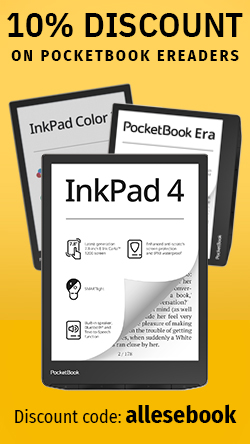ArtaTech Ends Partnership with Onyx, Launches New InkBook Obsidian eReader

In June 2015, I reported that the Polish Onyx Boox reseller Arta Tech launched a new eBook reader called the InkBook Onyx. Despite the similarity in name, it’s not a reader from the Chinese manufacturer Onyx International, but rather a rebranded Bouye T61, better known in this country as the Icarus Illumina.
The announcement was particularly interesting because Arta Tech was (at the time) one of the largest Onyx dealers in Europe. The devices were sold not only on their own website but also through various Amazon shops, making them accessible to a wide audience.
Although Onyx has consistently presented new versions of its eBook readers introduced in 2014 over the past few months, things have been relatively quiet here recently for the manufacturer. This is partly because none of the new models have made it to Western Europe.
I stumbled upon one of the reasons by accident a few days ago, and as it turns out, it’s not news: In August 2015, Arta Tech announced on their website that they would no longer work with Onyx International in the future:
“InkBook is the response to problems faced by Onyx International. To ensure customer satisfaction and improve product quality, Arta Tech has decided to end its cooperation with Onyx International and create a new, independent brand: InkBook.”
Known Issues in the Past
The exact problems are not specified. However, we are aware of two things that were not pleasing from a customer’s perspective:
- The Onyx Boox T68 was frequently shipped with faulty batteries. The issues began with the affected devices restarting on their own and only escaping the boot loop when connected to an external power source. The problems eventually worsened to the point where the battery completely failed. However, how many devices were affected was never clarified. On Mobileread, various buyers reported the same issue, especially during the product’s launch. Fortunately, affected devices were replaced under warranty.
- Onyx also made headlines with the E-Ink Smartphone E43. The device was released late and in very limited quantities. When the first pre-order customers received their phones, they were quickly disappointed because Onyx had apparently used IMEI numbers from other manufacturers. As a result, many devices could not be registered on the mobile network, making the phone usable only without its call function.
Whether these (or other) problems ultimately caused the rift between the two companies remains uncertain.
InkBook Obsidian as a Flagship
To be fair, one must also acknowledge that the reason for ending the collaboration could be financial: The InkBook brand might be easier to sell profitably.
In the meantime, the Polish retailer has three of its own eReaders on offer: InkBook Classic, Onyx, and Obsidian. The Classic model is an entry-level device without a touchscreen (but with a 212 ppi E-Ink Carta display). The Onyx is the same device as the Icarus Illumina, and the Obsidian has a flush front design. Contrary to the current market trend, all three devices still feature a 212 ppi display (meaning no 300-ppi “Retina” resolution).
Furthermore, the recently added InkBook Obsidian for 145 Euros offers the familiar technology: 8 GB of internal storage, expandable via MicroSD card, and WiFi for wireless internet connection. The device is powered by a 1 GHz dual-core processor, accompanied by 512 MB of RAM. It runs Android 4.2.2, which is open to app installations.
We’ve already provided an extensive overview of the Icarus Illumina, so you can find all the important information about the device in the device test and the Skoobe review. Recently, our colleague Nathan from The eBook Reader showcased the InkBook Obsidian in an (English-language) video:
Tolino and Icarus for German Modding Fans
The Obsidian eReader certainly sounds appealing, though German customers might be better off opting for the Icarus Illumina, Tolino Shine 2 HD, or Tolino Vision 3 HD. The Illumina is technically identical to the InkBook model, but it’s cheaper and comes pre-installed with the Skoobe app.
The Tolino devices can be rooted and opened for app installations in just a few steps. Compared to the other Android models, the Shine 2 HD and Vision 3 HD also feature 300 ppi displays, which perform excellently in practice.
